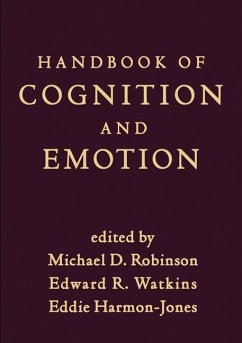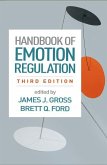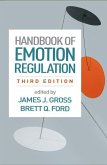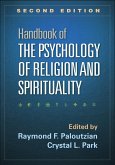Handbook of Cognition and Emotion
Herausgeber: Robinson, Michael D; Harmon-Jones, Eddie; Watkins, Edward R
Handbook of Cognition and Emotion
Herausgeber: Robinson, Michael D; Harmon-Jones, Eddie; Watkins, Edward R
- Gebundenes Buch
- Merkliste
- Auf die Merkliste
- Bewerten Bewerten
- Teilen
- Produkt teilen
- Produkterinnerung
- Produkterinnerung
Comprehensively examining the relationship between cognition and emotion, this authoritative handbook brings together leading investigators from multiple psychological subdisciplines. Biological underpinnings of the cognition-emotion interface are reviewed, including the role of neurotransmitters and hormones. Contributors explore how key cognitive processes--such as attention, learning, and memory--shape emotional phenomena, and vice versa. Individual differences in areas where cognition and emotion interact--such as agreeableness and emotional intelligence--are addressed. The volume also…mehr
Andere Kunden interessierten sich auch für
![Handbook of Emotion Regulation Handbook of Emotion Regulation]() Handbook of Emotion Regulation113,99 €
Handbook of Emotion Regulation113,99 €![Handbook of Emotion Regulation Handbook of Emotion Regulation]() Handbook of Emotion Regulation78,99 €
Handbook of Emotion Regulation78,99 €![Handbook of Emotions Handbook of Emotions]() Handbook of Emotions114,99 €
Handbook of Emotions114,99 €![Emotional Schema Therapy Emotional Schema Therapy]() Robert L. Leahy (USA Weill Cornell Medical College)Emotional Schema Therapy52,99 €
Robert L. Leahy (USA Weill Cornell Medical College)Emotional Schema Therapy52,99 €![Handbook of Emotions Handbook of Emotions]() Handbook of Emotions77,99 €
Handbook of Emotions77,99 €![Emotional Schema Therapy Emotional Schema Therapy]() Robert L. Leahy (USA Weill Cornell Medical College)Emotional Schema Therapy104,99 €
Robert L. Leahy (USA Weill Cornell Medical College)Emotional Schema Therapy104,99 €![Handbook of the Psychology of Religion and Spirituality Handbook of the Psychology of Religion and Spirituality]() Handbook of the Psychology of Religion and Spirituality70,99 €
Handbook of the Psychology of Religion and Spirituality70,99 €-
-
-
Comprehensively examining the relationship between cognition and emotion, this authoritative handbook brings together leading investigators from multiple psychological subdisciplines. Biological underpinnings of the cognition-emotion interface are reviewed, including the role of neurotransmitters and hormones. Contributors explore how key cognitive processes--such as attention, learning, and memory--shape emotional phenomena, and vice versa. Individual differences in areas where cognition and emotion interact--such as agreeableness and emotional intelligence--are addressed. The volume also analyzes the roles of cognition and emotion in anxiety, depression, borderline personality disorder, and other psychological disorders.
Hinweis: Dieser Artikel kann nur an eine deutsche Lieferadresse ausgeliefert werden.
Hinweis: Dieser Artikel kann nur an eine deutsche Lieferadresse ausgeliefert werden.
Produktdetails
- Produktdetails
- Verlag: Guilford Publications
- Seitenzahl: 594
- Erscheinungstermin: 29. März 2013
- Englisch
- Abmessung: 254mm x 183mm x 36mm
- Gewicht: 1212g
- ISBN-13: 9781462509997
- ISBN-10: 1462509991
- Artikelnr.: 36731388
- Herstellerkennzeichnung
- Libri GmbH
- Europaallee 1
- 36244 Bad Hersfeld
- gpsr@libri.de
- Verlag: Guilford Publications
- Seitenzahl: 594
- Erscheinungstermin: 29. März 2013
- Englisch
- Abmessung: 254mm x 183mm x 36mm
- Gewicht: 1212g
- ISBN-13: 9781462509997
- ISBN-10: 1462509991
- Artikelnr.: 36731388
- Herstellerkennzeichnung
- Libri GmbH
- Europaallee 1
- 36244 Bad Hersfeld
- gpsr@libri.de
Michael D. Robinson, PhD, is Professor of Psychology at North Dakota State University. He is associate editor of Emotion, the motivation/emotion section of Social and Personality Psychology Compass, and the Journal of Personality and Social Psychology. Dr. Robinson's research focuses on the areas of personality, cognition, and emotion. Edward R. Watkins, PhD, CPsychol, is Professor of Experimental and Applied Clinical Psychology at the University of Exeter, United Kingdom, and Director of the Mood Disorders Centre and the Study of Maladaptive to Adaptive Repetitive Thought (SMART) Lab. Dr. Watkins has practiced as a cognitive-behavioral therapist for 20 years, specializing in depression. His research focuses on the experimental understanding of psychopathology in depression--with a particular focus on repetitive negative thought and rumination--and the development and evaluation of new psychological interventions for mood disorders, including randomized controlled trials of treatments targeting rumination in depression. Dr. Watkins is a recipient of the British Psychological Society's May Davidson Award for outstanding contributions to the development of clinical psychology within the first 10 years of his career. Eddie Harmon-Jones, PhD, is Professor of Psychology at the University of New South Wales, Australia. A recipient of the Award for Distinguished Early Career Contributions to Psychophysiology from the Society for Psychophysiological Research, he is associate editor of Emotion. Dr. Harmon-Jones's research focuses on emotions and motivations, their implications for cognitive and social processes and behaviors, and their underlying neural circuits.
I. Overview of This Volume 1. Cognition and Emotion: An Introduction
Michael D. Robinson
Edward R. Watkins
and Eddie Harmon-Jones II. Biological Factors and Considerations 2. Neurogenetics Approaches: Insights from Studies of Dopamine Signaling and Reward Processing
Yuliya S. Nikolova
Ryan Bogdan
and Ahmad R. Hariri 3. Interactions between Attention and Emotion: Insights from the Late Positive Potential
Anna Weinberg
Jamie Ferri
and Greg Hajcak 4. Cognition-Emotion Interactions: A Review of the Functional Magnetic Resonance Imaging Literature
Luiz Pessoa and Mirtes G. Pereira 5. Hormones and Emotion: Stress and Beyond
Michelle M. Wirth and Allison E. Gaffey III. Cognitive Processes in Emotion 6. Attention and Emotion
Jenny Yiend
Kirsten Barnicot
and Ernst H. W. Koster 7. Generalization of Acquired Emotional Responses
Dirk Hermans
Frank Baeyens
and Bram Vervliet 8. The Role of Appraisal in Emotion
Agnes Moors and Klaus R. Scherer 9. Episodic Memory and Emotion
Brendan D. Murray
Alisha C. Holland
and Elizabeth A. Kensinger 10. Goals and Emotion
Charles S. Carver and Michael F. Scheier 11. Emotion Regulation and Cognition
Gaurav Suri
Gal Sheppes
and James J. Gross IV. Social Cognition 12. The Embodied Perspective on Cognition-Emotion Interactions
Piotr Winkielman and Liam C. Kavanagh 13. Mood Effects on Cognition
Joseph P. Forgas and Alex S. Koch 14. Cognition and Emotion in Judgment and Decision Making
Daniel Västfjäll and Paul Slovic 15. Incidental and Integral Effects of Emotions on Self-Control
Brandon J. Schmeichel and Michael Inzlicht V. Individual Differences 16. The Developmental Polyphony of Cognition and Emotion
Ross A. Thompson and Abby C. Winer 17. Affective Personality Traits and Cognition: Interactions between Extraversion/Neuroticism
Affect
and Cognition
Adam A Augustine
Randy J. Larsen
and Hwaryung Lee 18. The Influence of Behavioral Approach and Behavioral Inhibition Sensitivities on Emotive Cognitive Processes
Eddie Harmon-Jones
Tom F. Price
Carly K. Peterson
Philip A. Gable
and Cindy Harmon-Jones 19. The Cognitive and Motivational Foundations Underlying Agreeableness
William G. Graziano and Renée M. Tobin 20. Emotional Intelligence: Reconceptualizing the Cognition-Emotion Link
Marc A. Brackett
Michelle Bertoli
Nicole Elbertson
Elise Bausseron
Ruth Castillo
and Peter Salovey VI. Problems
Disorders
and Treatment 21. Repetitive Thought
Edward R. Watkins 22. Cognition and Emotion in Posttraumatic Stress Disorder
Thomas Ehring
Birgit Kleim
and Anke Ehlers 23. Anxiety Disorders
Amanda S. Morrison
Dina Gordon
and Richard G. Heimberg 24. Cognition and Depression: Mechanisms Associated with the Onset and Maintenance of Emotional Disorder
Peter C. Clasen
Seth G. Disner
and Christopher G. Beevers 25. Emotional Awareness: Attention Dysregulation in Borderline Personality Disorder
Ryan W. Carpenter
Stephanie Bagby-Stone
and Timothy J. Trull 26. Emotion
Motivation
and Cognition in Bipolar Spectrum Disorders: A Behavioral Approach System Perspective
Lauren B. Alloy
Ashleigh Molz
Olga Obraztsova
Benjamin G. Shapero
Abigail L. Jenkins
Shimrit K. Black
Kim E. Goldstein
Denis LaBelle
Elaine M. Boland
and Lyn Y. Abramson 27. Differentiating the Cognition-Emotion Interactions That Characterize Psychopathy versus Externalizing
Arielle R. Baskin-Sommers and Joseph P. Newman 28. Cognition
Emotion
and the Construction of Meaning in Psychotherapy
Leslie S. Greenberg 29. Cognitive Bias Modification: A New Frontier in Cognition and Emotion Research
Colin MacLeod and Patrick J. F. Clarke
Michael D. Robinson
Edward R. Watkins
and Eddie Harmon-Jones II. Biological Factors and Considerations 2. Neurogenetics Approaches: Insights from Studies of Dopamine Signaling and Reward Processing
Yuliya S. Nikolova
Ryan Bogdan
and Ahmad R. Hariri 3. Interactions between Attention and Emotion: Insights from the Late Positive Potential
Anna Weinberg
Jamie Ferri
and Greg Hajcak 4. Cognition-Emotion Interactions: A Review of the Functional Magnetic Resonance Imaging Literature
Luiz Pessoa and Mirtes G. Pereira 5. Hormones and Emotion: Stress and Beyond
Michelle M. Wirth and Allison E. Gaffey III. Cognitive Processes in Emotion 6. Attention and Emotion
Jenny Yiend
Kirsten Barnicot
and Ernst H. W. Koster 7. Generalization of Acquired Emotional Responses
Dirk Hermans
Frank Baeyens
and Bram Vervliet 8. The Role of Appraisal in Emotion
Agnes Moors and Klaus R. Scherer 9. Episodic Memory and Emotion
Brendan D. Murray
Alisha C. Holland
and Elizabeth A. Kensinger 10. Goals and Emotion
Charles S. Carver and Michael F. Scheier 11. Emotion Regulation and Cognition
Gaurav Suri
Gal Sheppes
and James J. Gross IV. Social Cognition 12. The Embodied Perspective on Cognition-Emotion Interactions
Piotr Winkielman and Liam C. Kavanagh 13. Mood Effects on Cognition
Joseph P. Forgas and Alex S. Koch 14. Cognition and Emotion in Judgment and Decision Making
Daniel Västfjäll and Paul Slovic 15. Incidental and Integral Effects of Emotions on Self-Control
Brandon J. Schmeichel and Michael Inzlicht V. Individual Differences 16. The Developmental Polyphony of Cognition and Emotion
Ross A. Thompson and Abby C. Winer 17. Affective Personality Traits and Cognition: Interactions between Extraversion/Neuroticism
Affect
and Cognition
Adam A Augustine
Randy J. Larsen
and Hwaryung Lee 18. The Influence of Behavioral Approach and Behavioral Inhibition Sensitivities on Emotive Cognitive Processes
Eddie Harmon-Jones
Tom F. Price
Carly K. Peterson
Philip A. Gable
and Cindy Harmon-Jones 19. The Cognitive and Motivational Foundations Underlying Agreeableness
William G. Graziano and Renée M. Tobin 20. Emotional Intelligence: Reconceptualizing the Cognition-Emotion Link
Marc A. Brackett
Michelle Bertoli
Nicole Elbertson
Elise Bausseron
Ruth Castillo
and Peter Salovey VI. Problems
Disorders
and Treatment 21. Repetitive Thought
Edward R. Watkins 22. Cognition and Emotion in Posttraumatic Stress Disorder
Thomas Ehring
Birgit Kleim
and Anke Ehlers 23. Anxiety Disorders
Amanda S. Morrison
Dina Gordon
and Richard G. Heimberg 24. Cognition and Depression: Mechanisms Associated with the Onset and Maintenance of Emotional Disorder
Peter C. Clasen
Seth G. Disner
and Christopher G. Beevers 25. Emotional Awareness: Attention Dysregulation in Borderline Personality Disorder
Ryan W. Carpenter
Stephanie Bagby-Stone
and Timothy J. Trull 26. Emotion
Motivation
and Cognition in Bipolar Spectrum Disorders: A Behavioral Approach System Perspective
Lauren B. Alloy
Ashleigh Molz
Olga Obraztsova
Benjamin G. Shapero
Abigail L. Jenkins
Shimrit K. Black
Kim E. Goldstein
Denis LaBelle
Elaine M. Boland
and Lyn Y. Abramson 27. Differentiating the Cognition-Emotion Interactions That Characterize Psychopathy versus Externalizing
Arielle R. Baskin-Sommers and Joseph P. Newman 28. Cognition
Emotion
and the Construction of Meaning in Psychotherapy
Leslie S. Greenberg 29. Cognitive Bias Modification: A New Frontier in Cognition and Emotion Research
Colin MacLeod and Patrick J. F. Clarke
I. Overview of This Volume 1. Cognition and Emotion: An Introduction
Michael D. Robinson
Edward R. Watkins
and Eddie Harmon-Jones II. Biological Factors and Considerations 2. Neurogenetics Approaches: Insights from Studies of Dopamine Signaling and Reward Processing
Yuliya S. Nikolova
Ryan Bogdan
and Ahmad R. Hariri 3. Interactions between Attention and Emotion: Insights from the Late Positive Potential
Anna Weinberg
Jamie Ferri
and Greg Hajcak 4. Cognition-Emotion Interactions: A Review of the Functional Magnetic Resonance Imaging Literature
Luiz Pessoa and Mirtes G. Pereira 5. Hormones and Emotion: Stress and Beyond
Michelle M. Wirth and Allison E. Gaffey III. Cognitive Processes in Emotion 6. Attention and Emotion
Jenny Yiend
Kirsten Barnicot
and Ernst H. W. Koster 7. Generalization of Acquired Emotional Responses
Dirk Hermans
Frank Baeyens
and Bram Vervliet 8. The Role of Appraisal in Emotion
Agnes Moors and Klaus R. Scherer 9. Episodic Memory and Emotion
Brendan D. Murray
Alisha C. Holland
and Elizabeth A. Kensinger 10. Goals and Emotion
Charles S. Carver and Michael F. Scheier 11. Emotion Regulation and Cognition
Gaurav Suri
Gal Sheppes
and James J. Gross IV. Social Cognition 12. The Embodied Perspective on Cognition-Emotion Interactions
Piotr Winkielman and Liam C. Kavanagh 13. Mood Effects on Cognition
Joseph P. Forgas and Alex S. Koch 14. Cognition and Emotion in Judgment and Decision Making
Daniel Västfjäll and Paul Slovic 15. Incidental and Integral Effects of Emotions on Self-Control
Brandon J. Schmeichel and Michael Inzlicht V. Individual Differences 16. The Developmental Polyphony of Cognition and Emotion
Ross A. Thompson and Abby C. Winer 17. Affective Personality Traits and Cognition: Interactions between Extraversion/Neuroticism
Affect
and Cognition
Adam A Augustine
Randy J. Larsen
and Hwaryung Lee 18. The Influence of Behavioral Approach and Behavioral Inhibition Sensitivities on Emotive Cognitive Processes
Eddie Harmon-Jones
Tom F. Price
Carly K. Peterson
Philip A. Gable
and Cindy Harmon-Jones 19. The Cognitive and Motivational Foundations Underlying Agreeableness
William G. Graziano and Renée M. Tobin 20. Emotional Intelligence: Reconceptualizing the Cognition-Emotion Link
Marc A. Brackett
Michelle Bertoli
Nicole Elbertson
Elise Bausseron
Ruth Castillo
and Peter Salovey VI. Problems
Disorders
and Treatment 21. Repetitive Thought
Edward R. Watkins 22. Cognition and Emotion in Posttraumatic Stress Disorder
Thomas Ehring
Birgit Kleim
and Anke Ehlers 23. Anxiety Disorders
Amanda S. Morrison
Dina Gordon
and Richard G. Heimberg 24. Cognition and Depression: Mechanisms Associated with the Onset and Maintenance of Emotional Disorder
Peter C. Clasen
Seth G. Disner
and Christopher G. Beevers 25. Emotional Awareness: Attention Dysregulation in Borderline Personality Disorder
Ryan W. Carpenter
Stephanie Bagby-Stone
and Timothy J. Trull 26. Emotion
Motivation
and Cognition in Bipolar Spectrum Disorders: A Behavioral Approach System Perspective
Lauren B. Alloy
Ashleigh Molz
Olga Obraztsova
Benjamin G. Shapero
Abigail L. Jenkins
Shimrit K. Black
Kim E. Goldstein
Denis LaBelle
Elaine M. Boland
and Lyn Y. Abramson 27. Differentiating the Cognition-Emotion Interactions That Characterize Psychopathy versus Externalizing
Arielle R. Baskin-Sommers and Joseph P. Newman 28. Cognition
Emotion
and the Construction of Meaning in Psychotherapy
Leslie S. Greenberg 29. Cognitive Bias Modification: A New Frontier in Cognition and Emotion Research
Colin MacLeod and Patrick J. F. Clarke
Michael D. Robinson
Edward R. Watkins
and Eddie Harmon-Jones II. Biological Factors and Considerations 2. Neurogenetics Approaches: Insights from Studies of Dopamine Signaling and Reward Processing
Yuliya S. Nikolova
Ryan Bogdan
and Ahmad R. Hariri 3. Interactions between Attention and Emotion: Insights from the Late Positive Potential
Anna Weinberg
Jamie Ferri
and Greg Hajcak 4. Cognition-Emotion Interactions: A Review of the Functional Magnetic Resonance Imaging Literature
Luiz Pessoa and Mirtes G. Pereira 5. Hormones and Emotion: Stress and Beyond
Michelle M. Wirth and Allison E. Gaffey III. Cognitive Processes in Emotion 6. Attention and Emotion
Jenny Yiend
Kirsten Barnicot
and Ernst H. W. Koster 7. Generalization of Acquired Emotional Responses
Dirk Hermans
Frank Baeyens
and Bram Vervliet 8. The Role of Appraisal in Emotion
Agnes Moors and Klaus R. Scherer 9. Episodic Memory and Emotion
Brendan D. Murray
Alisha C. Holland
and Elizabeth A. Kensinger 10. Goals and Emotion
Charles S. Carver and Michael F. Scheier 11. Emotion Regulation and Cognition
Gaurav Suri
Gal Sheppes
and James J. Gross IV. Social Cognition 12. The Embodied Perspective on Cognition-Emotion Interactions
Piotr Winkielman and Liam C. Kavanagh 13. Mood Effects on Cognition
Joseph P. Forgas and Alex S. Koch 14. Cognition and Emotion in Judgment and Decision Making
Daniel Västfjäll and Paul Slovic 15. Incidental and Integral Effects of Emotions on Self-Control
Brandon J. Schmeichel and Michael Inzlicht V. Individual Differences 16. The Developmental Polyphony of Cognition and Emotion
Ross A. Thompson and Abby C. Winer 17. Affective Personality Traits and Cognition: Interactions between Extraversion/Neuroticism
Affect
and Cognition
Adam A Augustine
Randy J. Larsen
and Hwaryung Lee 18. The Influence of Behavioral Approach and Behavioral Inhibition Sensitivities on Emotive Cognitive Processes
Eddie Harmon-Jones
Tom F. Price
Carly K. Peterson
Philip A. Gable
and Cindy Harmon-Jones 19. The Cognitive and Motivational Foundations Underlying Agreeableness
William G. Graziano and Renée M. Tobin 20. Emotional Intelligence: Reconceptualizing the Cognition-Emotion Link
Marc A. Brackett
Michelle Bertoli
Nicole Elbertson
Elise Bausseron
Ruth Castillo
and Peter Salovey VI. Problems
Disorders
and Treatment 21. Repetitive Thought
Edward R. Watkins 22. Cognition and Emotion in Posttraumatic Stress Disorder
Thomas Ehring
Birgit Kleim
and Anke Ehlers 23. Anxiety Disorders
Amanda S. Morrison
Dina Gordon
and Richard G. Heimberg 24. Cognition and Depression: Mechanisms Associated with the Onset and Maintenance of Emotional Disorder
Peter C. Clasen
Seth G. Disner
and Christopher G. Beevers 25. Emotional Awareness: Attention Dysregulation in Borderline Personality Disorder
Ryan W. Carpenter
Stephanie Bagby-Stone
and Timothy J. Trull 26. Emotion
Motivation
and Cognition in Bipolar Spectrum Disorders: A Behavioral Approach System Perspective
Lauren B. Alloy
Ashleigh Molz
Olga Obraztsova
Benjamin G. Shapero
Abigail L. Jenkins
Shimrit K. Black
Kim E. Goldstein
Denis LaBelle
Elaine M. Boland
and Lyn Y. Abramson 27. Differentiating the Cognition-Emotion Interactions That Characterize Psychopathy versus Externalizing
Arielle R. Baskin-Sommers and Joseph P. Newman 28. Cognition
Emotion
and the Construction of Meaning in Psychotherapy
Leslie S. Greenberg 29. Cognitive Bias Modification: A New Frontier in Cognition and Emotion Research
Colin MacLeod and Patrick J. F. Clarke








